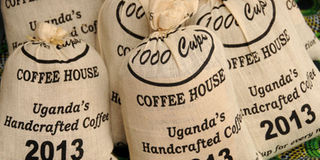Exports to ease as Uganda starts using single customs territory

Coffee will be the first beneficiary with other exports expected to be included soon. FILE PHOTO
What you need to know:
- The EAC bloc is composed of five countries including Uganda, Kenya, Tanzania, Rwanda, Burundi and South Sudan, whose application to fully join the trading bloc is still under consideration.
- The Single Customs Territory seeks to improve clearance time, reduce the cost of doing business as well as enhance application of cross border ICT systems.
- The system will also improve coordination of the private and public sector agencies among others.
Kampala. Clearing exports to various destinations will now take less time as Uganda begins using the Single Customs Territory.
The territory was officially rolled out on Monday for the export of commodities via Mombasa Port.
This is one of the stages towards the full attainment of the Customs Union that will eliminate tariffs and other restrictions as well as minimise internal border controls on goods moving between partner states.
The EAC bloc is composed of five countries including Uganda, Kenya, Tanzania, Rwanda, Burundi and South Sudan, whose application to fully join the trading bloc is still under consideration.
The Single Customs Territory was officially launched on Monday, starting with coffee, Uganda’s leading export commodity.
In an interview, Mr Abel Kagumire, the Uganda Revenue Authority manager for customs, said they would start with coffee in the first quarter before moving onto other commodities such tea, fish and skins and hides.
The Single Customs Territory seeks to improve clearance time, reduce the cost of doing business as well as enhance application of cross border ICT systems.
The system will also improve coordination of the private and public sector agencies among others.
Mr Emmanuel Iyamulemye, the Uganda Coffee Development Authority executive director, told Daily Monitor the system will support the already existing Uganda Electronic Single Window, an e-system that allows importers and exporters to submit coffee export documents online.
“We are optimistic about this. It is not only going to cut back on taxes and non-tariff barriers but will make doing business easy and our commodities will be able to reach the market on time,” he said.
Data from UCDA shows Uganda exported 401,930 (60 kilogramme) bags of coffee earning the country about Shs158b.
Export trends
According to data from Bank of Uganda, the country, as of November 2017, exported goods and services worth Shs11.5 trillion up from Shs9.8 trillion the previous year.
However, the increase was overshadowed by the huge import bill that stood at Shs20.8 trillion in the same time under review.
Much as Uganda recorded a 14 per cent increase in the value of exports in 2017 a lot needs to be done, especially on the supply chain constraints.
In the same period Uganda exports more goods to Comesa worth Shs4.5 trillion compared to other destinations.




